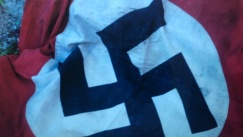How easily can Doctors be corrupted? We’ve just added onto the site for subscribers the testimony of Ken Yuasa who was a military doctor serving in the Japanese Imperial Army in China during the war. He describes in horrifying detail the medical experiments which Japanese doctors conducted on innocent Chinese civilians. He witnessed, for example, […]
WW2 Competitions
| 1 February 2011January Competition result
D Day Many congratulations to Shanice Jackson of Lancashire who has won the January subscribers’ competition. She was the first WW2History.com subscriber picked at random from those who gave the correct answer to last month’s question. She correctly identified Caen as the city which the Allies failed to take on the first day of the […]
WW2 People
| 19 January 2011Hitler and aging
Our journey It was my birthday this week – which is not a cause for wild jubilation once you are over forty five in my experience, and, unfortunately, I am most certainly over forty five. But it got me thinking about how our understanding changes as we age. And that in turn made me think […]
WW2 Relevance
| 12 January 2011Violent rhetoric and physical violence
Tucson, Arizona There is a relationship between violent political rhetoric and physical violence. Anyone who has studied the rise of Adolf Hitler and the Nazis is aware of that. Which is why I’m puzzled, in the light of the debate going on in America at the minute after the tragic shootings in Arizona, that this […]
WW2 People
| 5 January 2011Hitler and Munich
Munich – the ‘capital’ of the Nazi movement. We’ve just added a long essay on Adolf Hitler to the ‘Key Leaders’ section for subscribers. And writing it reminded me of the long association that Adolf Hitler had with one city – Munich. For Hitler, Munich was the most wonderful spot on earth. His joy at […]
WW2 Competitions
| 3 January 2011December Competition result
Many congratulations to Louise Morgan of Perthsire in Scotland who was the first person randomly selected from all those subscribers to WW2History.com who correctly answered last month’s competition. A signed, paperback copy of Ian Kershaw’s ‘Fateful Decisions’ together with a DVD of ‘WW2 Behind Closed Doors’ will shortly be winging their way to her. The […]
WW2 People
| 29 December 2010Siberians – tough people
Snow – the great leveler When I was out walking through the snow in the Chiltern Hills outside of London the other day, with the cold air penetrating through my thick clothes, I remembered the toughest man I have ever met. He was a Siberian, called Vasily Borisov. And exactly sixty nine years ago today […]
WW2 Anniversary
| 14 December 2010Roosevelt and the art of timing.
Winston Churchill and Franklin Roosevelt This Friday, 17th December, is the 70th anniversary of one of the most important speeches ever made by a democratic leader. On this day in 1940 President Franklin Roosevelt announced to the American people his idea of ‘Lend Lease’. Instead of selling the British what they needed to carry on […]
WW2 Relevance
| 6 December 2010Why bother knowing this history?
The coastline of what was East Prussia and is now Poland. A friend said to me the other day, after a convivial evening: ‘What is it with you? Why spend your time on World War Two and Nazis? Why don’t you move on to something useful!’ ‘Well,’ I replied. ‘Because I think it is useful […]
 Twitter
Twitter





